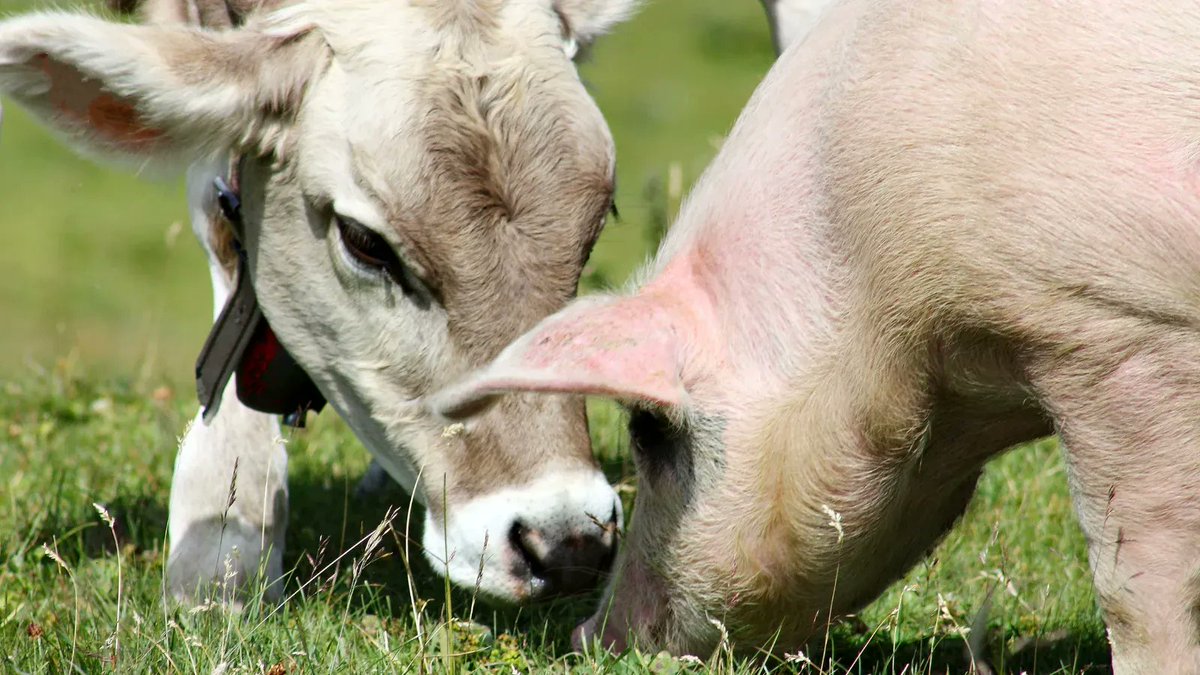Last month, @WMO reported that methane emissions are rising faster than ever.
Today, we explore how governments fail to tackle methane emissions from animal agriculture—and why we need to slash methane emissions now to tackle #GlobalWarming and ensure a livable future. 1/13
Today, we explore how governments fail to tackle methane emissions from animal agriculture—and why we need to slash methane emissions now to tackle #GlobalWarming and ensure a livable future. 1/13

2020 and 2021 saw the largest increases in methane emissions since records began, according to @WMO.
Their data indicates that biological sources, such as agriculture, are responsible, rather than #methane from gas leaks. @ConservationOrg reports. 2/13 conservation.org/blog/news-spot…
Their data indicates that biological sources, such as agriculture, are responsible, rather than #methane from gas leaks. @ConservationOrg reports. 2/13 conservation.org/blog/news-spot…
Animal agriculture contributes to global warming through GHG emissions, including methane and nitrous oxide.
Millions of ruminant animals raised for food globally, such as cows and sheep, emit #methane through a process called enteric fermentation. 3/13
sentientmedia.org/how-does-lives…
Millions of ruminant animals raised for food globally, such as cows and sheep, emit #methane through a process called enteric fermentation. 3/13
sentientmedia.org/how-does-lives…
40% of methane emissions come from agriculture, with 32% stemming directly from livestock farming.
Nonetheless, #meat and dairy emissions are often overlooked by countries committed to bringing down methane emissions. @JudyBankman reports. 4/13 sentientmedia.org/in-the-global-…
Nonetheless, #meat and dairy emissions are often overlooked by countries committed to bringing down methane emissions. @JudyBankman reports. 4/13 sentientmedia.org/in-the-global-…
After signing the #GlobalMethanePledge this year, Australia announced that the pledge does not require farmers to reduce animal numbers and that emissions from animal agriculture will not be taxed.
Jane Byrne reports via @FeedNavigator. 5/13
feednavigator.com/Article/2022/1…
Jane Byrne reports via @FeedNavigator. 5/13
feednavigator.com/Article/2022/1…
In New Zealand, methane from cows and sheep accounts for ~90% of methane emissions.
This year, the country proposed charging farmers $2-3 per tonne of CO2e of methane, a plan @GreenpeaceNZ opposes for not being ambitious enough. @joeloyo @ClimateHome 6/13
climatechangenews.com/2022/10/24/fea…
This year, the country proposed charging farmers $2-3 per tonne of CO2e of methane, a plan @GreenpeaceNZ opposes for not being ambitious enough. @joeloyo @ClimateHome 6/13
climatechangenews.com/2022/10/24/fea…
The UK’s agricultural sector accounts for 47% of its #methane emissions.
A plan announced by @NFu to bring down emissions depends on feed additives & gene editing but does not mention lowering animal numbers through dietary change. @HamlettClaire 7/13
sentientmedia.org/animal-rebelli…
A plan announced by @NFu to bring down emissions depends on feed additives & gene editing but does not mention lowering animal numbers through dietary change. @HamlettClaire 7/13
sentientmedia.org/animal-rebelli…
Until recently, methane has often been neglected in climate discussions.
Now more and more scientists, including @IPCC_CH experts, urge policymakers to bring down methane emissions to prevent catastrophic climate change. @katabeta report via @cenmag. 8/13
cen.acs.org/environment/cl…
Now more and more scientists, including @IPCC_CH experts, urge policymakers to bring down methane emissions to prevent catastrophic climate change. @katabeta report via @cenmag. 8/13
cen.acs.org/environment/cl…
Methane is 80 times more efficient than CO2 at trapping atmospheric heat in the 20 years following its release.
However, #methane stays in the atmosphere for only around 10 years, unlike CO2, which can persist for thousands of years. @down2earthindia 9/13
downtoearth.org.in/news/climate-c…
However, #methane stays in the atmosphere for only around 10 years, unlike CO2, which can persist for thousands of years. @down2earthindia 9/13
downtoearth.org.in/news/climate-c…
“Defossilisation will not lead to cooling until about 2050,” says @DurwoodZaelke, @IGSD_DC. “Cutting methane gives us time.”
@fionaharvey reports on scientists urging us to tackle methane emissions now to stand a chance against the #ClimateCrisis. 10/13 theguardian.com/environment/20…
@fionaharvey reports on scientists urging us to tackle methane emissions now to stand a chance against the #ClimateCrisis. 10/13 theguardian.com/environment/20…
Studies consistently show that livestock farming is the biggest source of food emissions and that #PlantBased products are much better for the planet.
@jennysplitter reports on the need to transition to a plant-rich and justice-centered #FoodSystem. 11/13
sentientmedia.org/new-study-conf…
@jennysplitter reports on the need to transition to a plant-rich and justice-centered #FoodSystem. 11/13
sentientmedia.org/new-study-conf…
Dietary change can effectively reduce food emissions, including #methane. A study published this year found that from 2003 to 2018, GHG emissions in the US diet fell by 35+%.
Reduced beef consumption contributed to more than half of these savings. 12/13
sciencedirect.com/science/articl…
Reduced beef consumption contributed to more than half of these savings. 12/13
sciencedirect.com/science/articl…
We urgently need to find, develop and implement more sustainable ways of producing food to slow #GlobalWarming and ensure a livable future.
Help us continue our reporting on the climate impacts of #AnimalAgriculture by joining our membership.👇 13/13
sentientmedia.org/donate
Help us continue our reporting on the climate impacts of #AnimalAgriculture by joining our membership.👇 13/13
sentientmedia.org/donate

• • •
Missing some Tweet in this thread? You can try to
force a refresh









